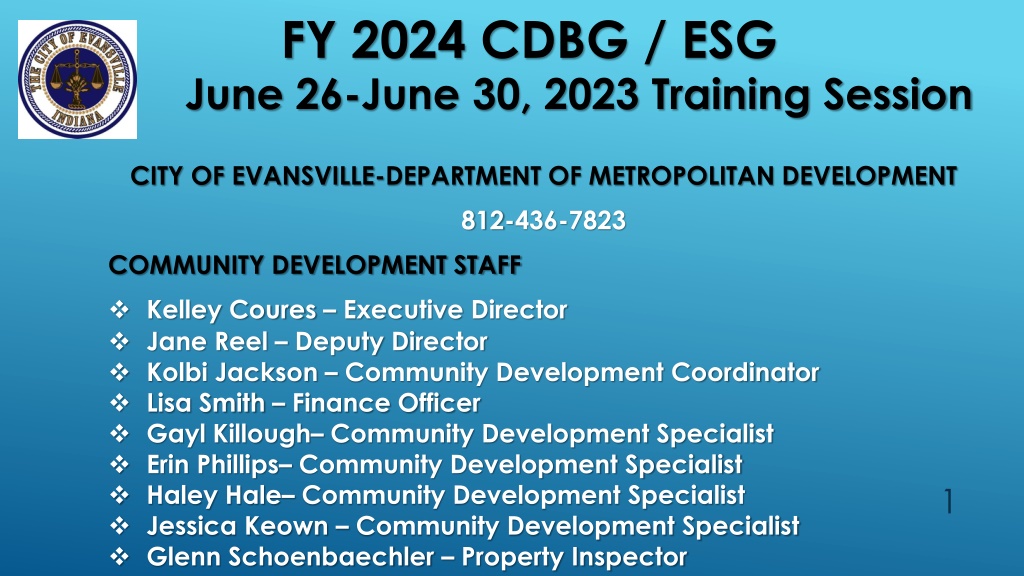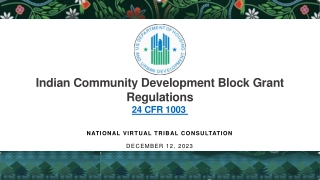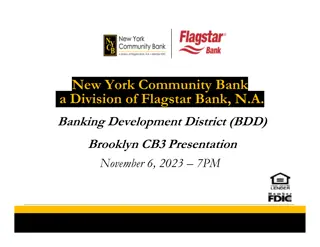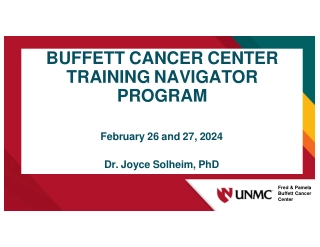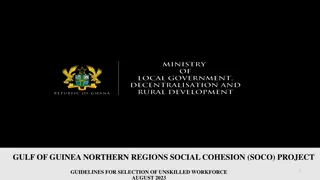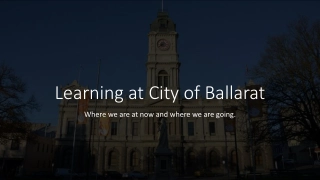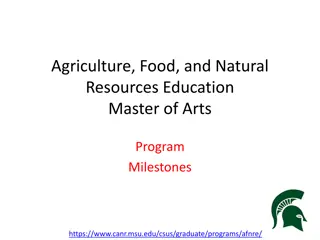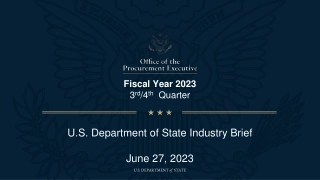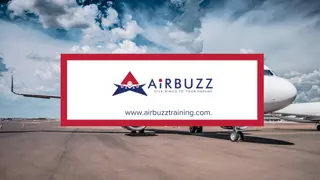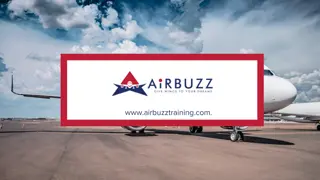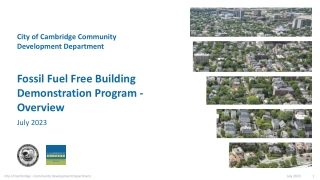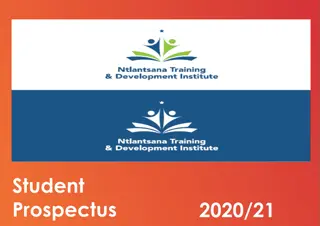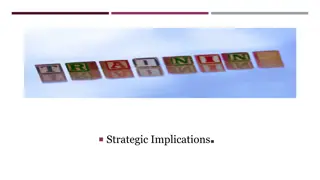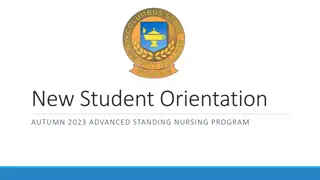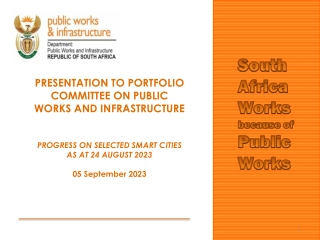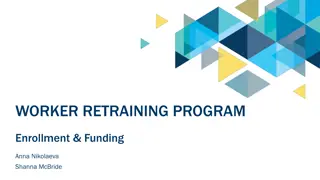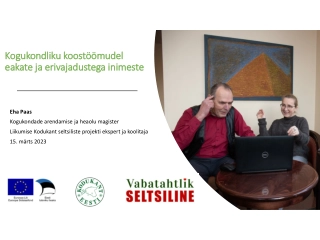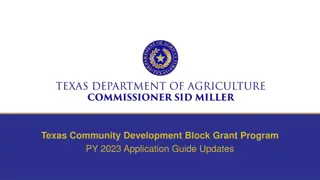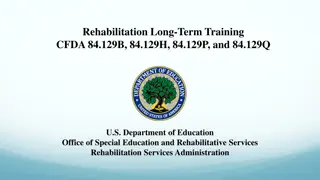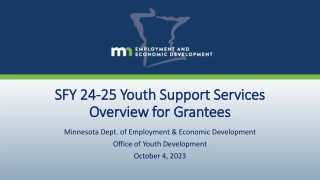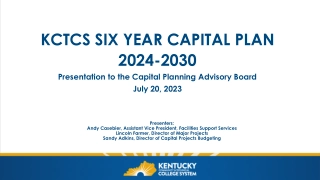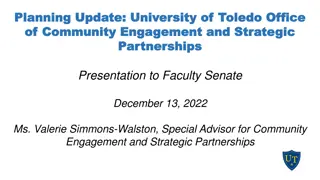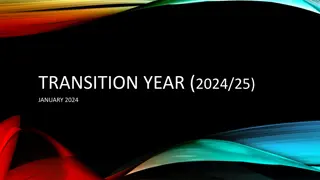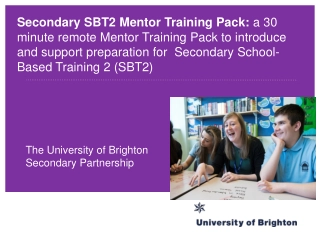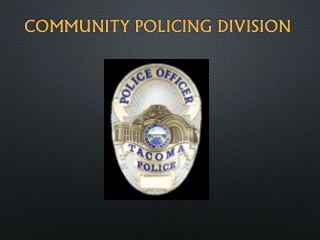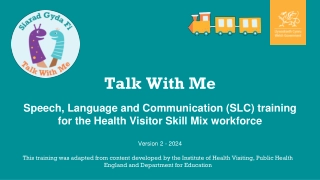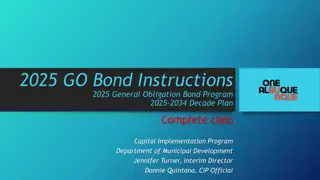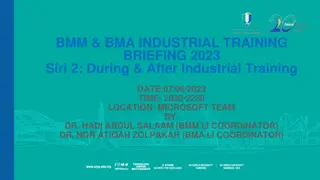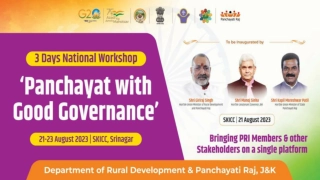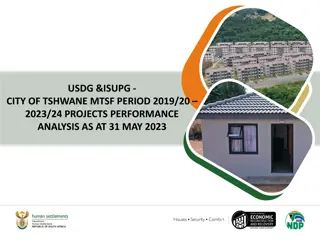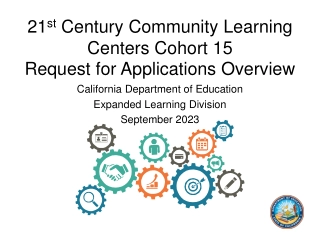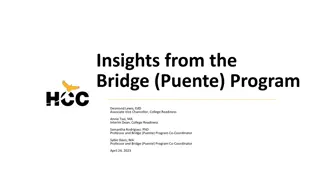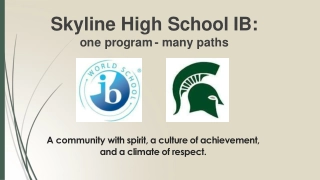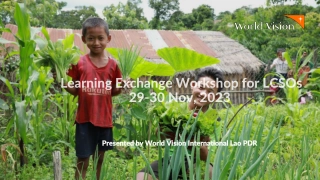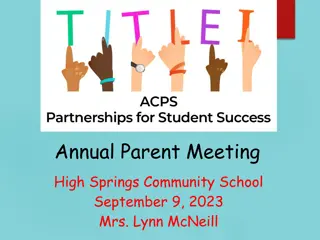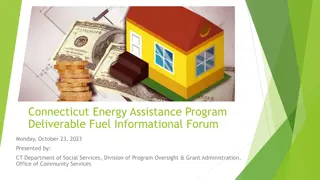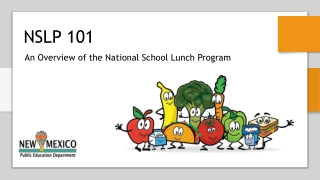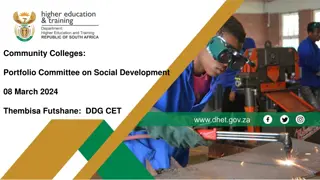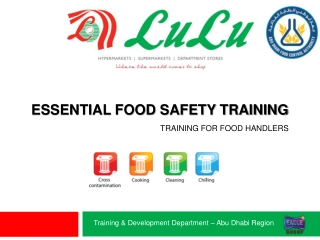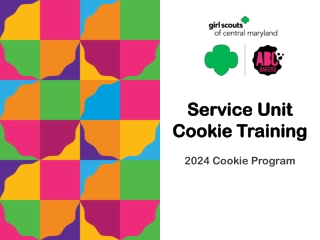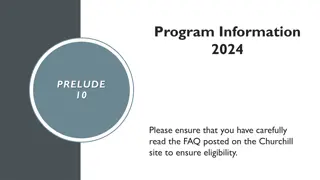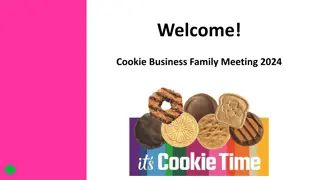City of Evansville Community Development Training and Program Overview
The City of Evansville's Department of Metropolitan Development provides a comprehensive training session for their Community Development staff, detailing the upcoming CDBG/ESG grants, proposal schedules, and HUD regulations. The training covers various aspects such as financial responsibility, proposal submissions, monitoring reports, and more for the upcoming program year. The staff members involved in the program are listed, along with key dates and resources essential for successful program implementation.
City of Evansville Community Development Training and Program Overview
PowerPoint presentation about 'City of Evansville Community Development Training and Program Overview'. This presentation describes the topic on The City of Evansville's Department of Metropolitan Development provides a comprehensive training session for their Community Development staff, detailing the upcoming CDBG/ESG grants, proposal schedules, and HUD regulations. The training covers various aspects such as financial responsibility, proposal submissions, monitoring reports, and more for the upcoming program year. The staff members involved in the program are listed, along with key dates and resources essential for successful program implementation.. Download this presentation absolutely free.
Presentation Transcript
FY 2024 CDBG / ESG June 26-June 30, 2023 Training Session CITY OF EVANSVILLE-DEPARTMENT OF METROPOLITAN DEVELOPMENT 812-436-7823 COMMUNITY DEVELOPMENT STAFF Kelley Coures Executive Director Jane Reel Deputy Director Kolbi Jackson Community Development Coordinator Lisa Smith Finance Officer Gayl Killough Community Development Specialist Erin Phillips Community Development Specialist Haley Hale Community Development Specialist Jessica Keown Community Development Specialist Glenn Schoenbaechler Property Inspector 1
Timeline ( ) Monthly Monitoring Reports CDBG Overview HUD Allocations CDBG and ESG Financial Responsibility ESG Overview Proposals 2
2024 Program Year: July 1, 2024 to June 30, 2025 JUNE 2023 2024 CDBG/ESG GRANT TRAINING Sun M T W TH F Sat 1 2 3 4 5 6 7 8 9 10 11 12 13 14 15 16 17 18 19 20 21 22 23 24 25 26 27 28 29 30 3
JULY 2023 T W 2024 CDBG/ESG PROPOSALS AVAILABLE Final day to contact CD Staff for Proposal Review Sun M TH F Sat 1 2 3 4 5 6 7 8 9 10 11 12 13 14 15 2024 16 17 18 19 20 21 22 Approved CDBG & ESG Proposals due 23 24 25 26 27 28 29 30 31 Aug 1 Aug 2 4
2024 PROPOSAL SCHEDULE CONTINUED January 2024 March 2024 1 2 3 4 1 2 3 4 5 6 7 8 5 6 7 8 9 10 11 9 10 11 12 13 14 15 12 13 14 15 16 17 18 16 17 18 19 20 21 22 19 20 21 22 23 24 25 23 24 25 26 27 Tentative date for City Council Presentations 28 29 26 27 28 29 30 31 Tentative date for CAC Presentations 30 31 5
Timeline ( ) Monthly Monitoring Reports CDBG Overview HUD Allocations CDBG and ESG Financial Responsibility ESG Overview Proposals 6
HUD RESOURCES The City of Evansville must follow HUD Regulations in the use of CDBG funds (Subpart A 570) Guidance and links to HUD regulations can be found at the City of Evansville, Community Development webpage: https://www.hudexchange.info/programs/cdbg/ 7
CDBG REVIEW National Objectives 1. Benefit Low- and Moderate Income Persons/Households Activities funded with CDBG must meet one of HUD s 3 National Objectives 2. Eliminate Conditions of Slum and Blight 3. Meet a Community Urgent Need (NA) 8
CDBG REVIEW CONTINUED National Objectives 1. Benefit low-and moderate-income (LMI) persons/ households a) Area benefit activities This is an activity which benefits all residents in a particular area, where at least 51% of the residents are LMI persons. 9
CDBG REVIEW CONTINUED National Objectives continued b) Limited Clientele (LMC) 51% LMI Presumed Benefit (LMC/PB)-Must serve certain clientele exclusively: Abused children Elderly (62 years or older) Battered spouses Severely disabled adults Illiterate adults Persons living with HIV/AIDS Migrant farm workers Homeless persons 11
CDBG REVIEW CONTINUED National Objectives continued c) Housing Benefit (LMH) Single Family 100% LMI Multi-Family 51% LMI d) Job Creation/Retention (LMJ) Where 51% of jobs are taken by or made available to LMI persons 12
CDBG ELIGIBLE ACTIVITIES Acquisition of Real Property Clearance Code Enforcement Construction of Housing Disposition Homeownership Assistance Interim Assistance Loss of Rental Income Microenterprise Assistance Miscellaneous Other Activities Planning and Capacity Building Privately-Owned Utilities Program Administration Costs Public Facilities and Improvements Public Services Rehabilitation Relocation Special Activities by CBDOs Special Economic Development Activities 14
CDBG INELIGIBLE ACTIVITIES The following activities may not be assisted with CDBG funds under any circumstance: Buildings or portions thereof, used for the general conduct of government General government expenses Political activities 15
CDBG INELIGIBLE ACTIVITIES CONTINUED The following activities may not be assisted with CDBG funds unless authorized as Special Economic Development Activities under 570.203 or when carried out by a Community Based Development Organization (CBDO) under the provisions of 570.204. Purchase of equipment Construction equipment Fire protection equipment Furnishings and personal property Operating and maintenance expenses New housing construction Income payments 16
SUMMARY OF CDBG ACTIVITIES Eligible activities are so broad that it is easy to forget that some things cannot be done under the program. Some activities will require an Eligibility Review by CD Staff to provide guidance in determining the eligibility of activities frequently associated with housing and community development. 17
Timeline ( ) Monthly Monitoring Reports CDBG Overview HUD Allocations CDBG and ESG Financial Responsibility ESG Overview Proposals 18
EMERGENCY SOLUTIONS GRANT (ESG) In Evansville there are about 500 individuals in shelter or transitional housing on any given night 50-60 homeless individuals on the street or places not meant for habitation More than 2000 homeless served annually Shelters stay at maximum capacity all year HUD s goal is to lessen the length of stay in shelter and move to permanent housing faster Coordinated Entry Assessment prioritizes the homeless 19 Funds are meant to coordinate with other homeless funds such as CoC funds
ESG CONTINUED 4 Categories of Homelessness based on CoC and ESG: Category 1: Literally Homeless. Category 2: Imminent Risk of Homelessness. Category 3: Homeless Under Other Federal Statutes. Category 4: Fleeing/Attempting to Flee Domestic Violence.
ESG REGION 12 GOALS The Region 12 Charter adopted on 12/14/2012 included 11 goals These 11 goals have been consolidated to the following: Support the availability of public services Support rapid re-housing Support the coordinated entry system Support re-entry Homeless goals support the overall annual goals of the City of Evansville 21
ESG CONTINUED HEARTH Act stands for the Homeless Emergency and Rapid Transition to Housing Act of 2009. Emergency Solutions Grant (ESG) is authorized by the HEARTH Act. The current interim rule of the Emergency Solutions Grant took effect January 2012. ESG has very strict requirements. CDBG is a lot more flexible compared to ESG.
ESG CONTINUED Emergency Solutions Grant (ESG) program completely replaced the Emergency Shelter Grant program of the late 70s The current ESG is roughly equivalent to 60% of the old ESG
ESG ELIGIBLE ACTIVITIES Serving: Component Those who are Homeless Those who are at risk of Homelessness 1. Street Outreach 2. Emergency Shelter 3. Homelessness Prevention* 4. RapidHousing 5. Administration Data Collection: 6. Homeless Management InformationSystem(HMIS) (provided by IHCDA) Details and instructions are located at 24 CFR 576 Subpart B Program Components and Eligible Activities (24 CFR 576.100 109) * Default to Rapid Re-Housing 24
ESG CONTINUED Street Outreach Eligible Program Participants: Unsheltered homeless people who are unwilling or unable to access emergency shelter, housing, or an appropriate health facility, meaning those who qualify under paragraph (1)(i) of the definition of homeless , which includes individuals and families with a primary nighttime residence that is a public or private place not designed for or ordinarily used as a regular sleeping accommodation for human beings, including a car, park, abandoned building, bus or train station, airport or campground. Overview of Eligible Activities: Essential services* to eligible participants provided on the street or in parks, abandoned buildings, bus stations, campgrounds, and in other such settings where unsheltered persons are staying. Staff salaries related to carrying out street outreach activities are also eligible. * Essential services must be included under the street outreach component in the interim rule to be eligible with ESG funds.
ESG CONTINUED Emergency Shelter Eligible Program Participants: Individuals and families who are homeless (Categories 1-4 of the Homeless definition). Eligible Activities: Essential services to persons in emergency shelters*, renovating buildings to be used as emergency shelters, and operating emergency shelters. Staff costs related to carrying out emergency shelter activities are also eligible. Costs to operate and maintain emergency shelters and also provide other emergency lodging when appropriate. ESG funds may be used for day shelter if: Meets the definition of a shelter 576.2
ESG CONTINUED Rapid Re-housing Homeless Definition: Categories 1-4 of the Homeless definition. Individuals and families must have an income at or below 30% AMI at annual re-evaluation. Overview of Eligible Activities: Short and medium term rental assistance and housing relocation and stabilization services. Staff salaries related to carrying out rapid re-housing.
ESG CONTINUED The City estimates $200,000 of ESG funds based on prior year allocations. Rapid Re-Housing must be funded per HUD rules. For ESG, funds start out in Rapid Re-Housing as the default. All ESG can be allocated to Rapid Re-Housing or allocate less than $129,964 to Homeless Assistance (Street Outreach, Emergency Shelter) More than $70,036 must remain in Rapid Re-Housing.
RECORD RETENTION Recipients of federal funds are responsible for proper recordkeeping and retention. Records should be sufficient to establish an audit trail for all transactions involving federal funds. An audit trail for federal funds originates with the preparation of the grant proposal or contract proposal, and includes adequate records to support statements in the proposal document. ESG records must be kept 5 years after the conclusion (Close- out) of the program: effectively 6 years. 29
MATCH REQUIREMENTS Each ESG sub-recipient, must match funding provided with an equal amount of funds from other sources. Matching funds must be related to expenditures occurring after the date of grant award. Funds used to match a previous ESG grant may not be used to match a subsequent grant award. 30
MATCH REQUIREMENTS (CONTINUED) In general, matching funds provided may consist of: Amount of funds from other sources; Salary paid to staff (not included in the award) to carry out the project of Grantee; The value of any donated material or building, or of any lease, calculated using a reasonable method to establish a fair market value; Time contributed by volunteers; and Matching funds or voluntary efforts provided by any recipient or project sponsor. 31 24 CFR 576.201 contains match requirements
Timeline ( ) Monthly Monitoring Reports CDBG Overview HUD Allocations CDBG and ESG Financial Responsibility ESG Overview Proposals 32
PROPOSALS The 2024 CDBG and ESG proposal packets will be available on the City of Evansville, Community Development website by July 3, 2023 at the link below: www.evansville.in.gov/cdfederalprograms 33
SUMMARY OF PROPOSAL: Both the CDBG and ESG Proposals are divided into (4)sections. General Information Project information Financial Affiliations and Board of Directors Information 35
PROPOSALS 36
PROPOSALS 37
PROPOSALS 38
PROPOSALS 39
PROPOSALS There are several additional documents included with grant proposals Verification Page Original signature required Conflict of Interest Questionnaire complete one for each program submitted ALL DOCUMENTS LISTED ABOVE WILL BE AVAILABLE ON THE CITY WEBSITE AS OF JULY 3, 2023 40
PROPOSALS 41
PROPOSALS 42
SUMMARY OF REQUIRED ATTACHMENTS Current 501 C (3) or 501 C (4) Documents CBDO Certification letter (if applicable) Most recent Audit report Resumes, etc . Current MOU s (if applicable) Complete List of Board Members Policy and Procedures for Board Member participation Conflict of Interest Statement 43
PROPOSAL SUBMITTAL PROCESS Attendance at proposal training session is mandatory Proposals available on City website by July 3rd www.evansville.in.gov/cdfederalprograms Complete proposal and schedule review appointment with assigned CD Specialist After review appointment with CD Specialist, make edits as needed and submit Word format ONLY copy of proposal via email to Specialist. Include all supporting documentation as required with final proposal. Deliver final, signed copy of proposal with $20.00 fee (checks required, no cash or personal checks) for each proposal submitted to DMD, Room 306 Civic Center Complex by 4:00 pm on August 2nd . Checks to be made out to the Department of Metropolitan Development (include description in memo line) Application fee is NOT reimbursable 44
PROPOSAL TIMELINE Agency Mandatory Appointment with CD staff for Proposal review: July 3rd to July 28th JULY 2023 Sun AUGUST 2023 Sun M T W TH F Sat M T W TH F Sat 1 1 2 3 4 5 2 3 4 5 6 7 8 6 7 8 9 10 11 12 9 10 11 12 13 14 15 13 14 15 16 17 18 19 16 17 18 19 20 21 22 20 21 22 23 24 25 26 23 24 25 26 27 28 29 45 27 28 29 30 31 30 31 2024 Approved Proposals due: August 2nd
Agency Packets Welcome Letter Playing by the Rules Handbook for CDBG Subrecipients SAM Information Vendor Registration Information Claim Reimbursement Information 46
Timeline ( ) Monthly Monitoring Reports CDBG Overview HUD Allocations CDBG and ESG Financial Responsibility ESG Overview Proposals 47
FINANCIAL RESPONSIBILITY Introduction Overview Vendor Self-Service SAM Registration Claims Process Example of Claim Packet Common issues with Claim Submissions Monthly Monitoring Reports Timeliness Reconciliation Responsibilities Audits Wrap-up 48
INTRODUCTION Lisa C. Smith, Finance Officer Department of Metropolitan Development 812-436-7807 lismith@evansville.in.gov 49
OVERVIEW The City of Evansville (COE), the Department of Metropolitan Development (DMD) . follow Indiana State Board of Accounts guidelines for accounts payable processing. its agencies and subrecipients, must comply with the Office of Management and Budget Guidance (Code of Federal Regulations) 2 CFR Part 200, the Uniform Administrative Requirements, Cost Principals, and Audit Requirements for Federal Awards. and HUD expect that subrecipients will comply with all applicable Federal requirements, document your performance, and follow effective accounting and management practices. Simply stated, Federal and State requirements specify how DMD can disburse these funds. DMD and all Subrecipients of these funds are required to follow these regulations. 50
